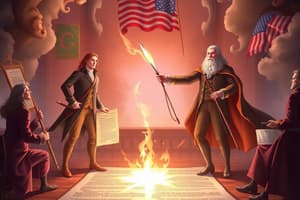Podcast
Questions and Answers
What does ratification mean?
What does ratification mean?
- Legal dispute
- Withdrawal of consent
- Informal agreement
- Formal approval (correct)
What type of democracy does the United States have?
What type of democracy does the United States have?
Representative Democracy
What were the Federalist Papers written for?
What were the Federalist Papers written for?
To encourage the ratification of the Constitution
What was the first constitution of the United States called?
What was the first constitution of the United States called?
Antifederalists supported the ratification of the Constitution.
Antifederalists supported the ratification of the Constitution.
How much of a person were slaves counted as according to the three-fifths compromise?
How much of a person were slaves counted as according to the three-fifths compromise?
Federalists favored the ratification of the Constitution.
Federalists favored the ratification of the Constitution.
What branch of government makes laws?
What branch of government makes laws?
A limited government means that it has unrestricted power.
A limited government means that it has unrestricted power.
Which chamber of Congress is based on equality in representation?
Which chamber of Congress is based on equality in representation?
What branch of government enforces laws?
What branch of government enforces laws?
What does James Madison argue is the solution to divisive interest groups?
What does James Madison argue is the solution to divisive interest groups?
What is another term for 'central' or 'national' government?
What is another term for 'central' or 'national' government?
What are the first ten amendments to the Constitution called?
What are the first ten amendments to the Constitution called?
What concept states that government can only exist with the consent of the governed?
What concept states that government can only exist with the consent of the governed?
Which chamber of Congress bases representation on population?
Which chamber of Congress bases representation on population?
What document replaced the Articles of Confederation?
What document replaced the Articles of Confederation?
What is the type of legislature that resulted from the Great Compromise?
What is the type of legislature that resulted from the Great Compromise?
Who is known as the 'Father of the Constitution'?
Who is known as the 'Father of the Constitution'?
What branch of government interprets laws?
What branch of government interprets laws?
Under the Articles of Confederation, which entity had the most power?
Under the Articles of Confederation, which entity had the most power?
Who believed that government should ensure the right to life, liberty, and property?
Who believed that government should ensure the right to life, liberty, and property?
What is a legislature consisting of one body called?
What is a legislature consisting of one body called?
What rebellion exemplified the weakness of the federal government?
What rebellion exemplified the weakness of the federal government?
What compromise forbids taxing exports?
What compromise forbids taxing exports?
What term describes divisive interest groups that could threaten national unity?
What term describes divisive interest groups that could threaten national unity?
What principle ensures a system of checks and balances in government?
What principle ensures a system of checks and balances in government?
What rebellion demonstrated that the Constitution was strong enough to stop a domestic revolt?
What rebellion demonstrated that the Constitution was strong enough to stop a domestic revolt?
Flashcards are hidden until you start studying
Study Notes
Fundamental Concepts in Government
- Ratification: The formal approval process needed for the adoption of the Constitution.
- Representative Democracy: A system where citizens elect officials to represent their interests and make decisions on their behalf.
- Federalist Papers: A collection of writings aimed at promoting the ratification of the U.S. Constitution, addressing concerns and explaining its principles.
Early Government Structures
- Articles of Confederation: The initial governing document for the United States, creating a weak national government.
- Federalists vs. Antifederalists: Federalists supported the Constitution's ratification; Antifederalists opposed it, fearing it granted too much power to the central government.
Important Constitutional Features
- Three-Fifths Compromise: A compromise allowing states to count enslaved individuals as three-fifths of a person for representation and taxation purposes.
- Branches of Government:
- Legislative: Responsible for law-making (Congress).
- Executive: Enforces laws (President and administration).
- Judicial: Interprets laws (Supreme Court and other courts).
- Bicameral Legislature: A legislative body composed of two chambers; established via the Great Compromise integrating the Virginia Plan and New Jersey Plan.
Key Amendments and Principles
- Bill of Rights: The first ten amendments to the Constitution added to protect individual liberties and secure state support for ratification.
- Popular Sovereignty: The principle that government’s authority is derived from the consent of the governed.
Notable Historical Figures
- James Madison: Known as the "Father of the Constitution" for his pivotal role in its drafting and ratification process.
- John Locke: Philosopher whose ideas on life, liberty, and property influenced the development of governmental philosophy in the U.S.
Challenges and Responses
- Shays’ Rebellion: An armed uprising demonstrating the weaknesses of the federal government under the Articles of Confederation.
- Whiskey Rebellion: A domestic revolt that tested the federal government's ability to maintain order, illustrating the Constitution's strength.
Governance Structure
- Federal Government: Often referred to as central or national government, it holds authority over states as delineated by the Constitution.
- House of Representatives: Chamber of Congress with representation based on state population.
- Senate: Chamber of Congress with equal representation from each state, regardless of population.
Governance Theories
- Factions: Groups arising from divisive interests, potentially damaging to national unity.
- Separation of Powers: The distribution of governmental powers across branches to prevent any one entity from gaining too much control; embodies the system of checks and balances.
Constitutional Changes
- Unicameral vs. Bicameral: Unicameral refers to a single legislative body, whereas bicameral consists of two, as established in the current U.S. Congress.
- Commerce Compromise: Agreement addressing trade regulations, specifically banning export taxes to encourage economic activity.
Studying That Suits You
Use AI to generate personalized quizzes and flashcards to suit your learning preferences.




